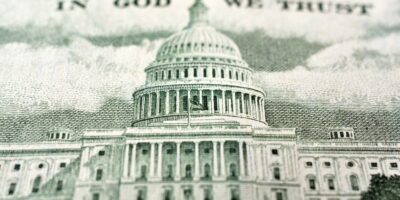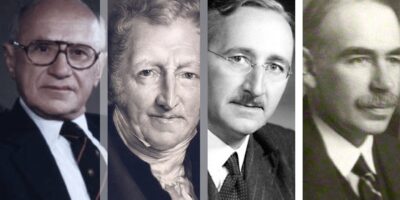The Struggle Over “Basic Economics”

It’s time we have a talk about “basic economics.”
The set of ideas broadly speaking to the principle that markets and individual choice will deliver economic results superior to central planning is at the heart of virtually every modern economic policy debate, from reopening businesses that governments forced to close in the wake of the COVID-19 pandemic to longer-term questions such as poverty, healthcare, and the environment. “Basic Economics” is evoked both by those who favor less state planning in markets than has been the norm in the past several decades and those who favor more.
Professor Peter Boettke sees free markets and the centuries-long classical tradition arguing in their favor as being built on a foundation of truth, beauty, hope, and compassion. The disconnect found in essays like “Economics is a failing discipline doing great harm – so let’s rethink it,” by author Andrew Simms in The Guardian last year, can be maddening. Simms sees the same largely pro-market foundational theory as being both naive and a tool of oligarchic manipulation leading society to disaster.
What’s going on here? Simms’ view of basic economics, increasingly echoed to at least some extent in the mainstream of the profession, is confused less about the ideas themselves and more about how thinkers arrived at them. And because of the pivot taken by most of the field in the twentieth century toward mathematical rigor, that confusion turns out to be a very big deal.
Anything But Basic
In opening remarks during a recent episode of the Boettke-recommended webinar series The Economic Implications of Covid-19, host Professor Markus Brunnermeier (Director of Princeton’s Bendheim Center for Finance) held a flash survey among the audience watching the program live. The question was should business reopenings be planned centrally, and the responses were:
- “Yes, since private firms don’t internalize externalities;
- No, since central planning stifles innovation on how to creatively manage the new COVID economy.”
The highly unscientific poll yielded 63 percent in favor of central planning, easy but dangerous to dismiss. Based on prevailing views in the mainstream of the economics profession today (each show features a lecture from a guest economist, usually widely known), my own guess was that about two thirds would favor the centrally planned option.
Brunnermeier’s question, and particularly how he frames the answers, shows a very clear understanding of one of the reasons market competition is so important in a complex society, especially with respect to innovation–a lot of ideas are better than a few. With parallels to biological evolution, let firms generate ideas for “best practices” in a new normal full of uncertainty and let the winners be copied.
But he misses perhaps an even more important point. Brunnermeier’s formulation reflects a surface understanding that innovative ideas are something these firms develop “in the market,” but it doesn’t take seriously the fact that market competition must actually happen.
Faced with uncertainty across so many dimensions, reopening firms are not simply central planners with smaller jurisdictions than government. Their best practices emerge as they do business in this new landscape, observe price signals, make mistakes, and ultimately adjust countless times. The process of competition is what central planners can’t replicate.
Classical Foundations
Boettke and Donald Boudreaux, both AIER Senior Fellows and professors at George Mason University, write prolifically for this website and elsewhere about market process theory, swimming against the tide of modern economics by putting these ideas front and center. Boudreaux, writing recently about COVID-19 recovery, is worth quoting at length:
The best microeconomists have learned that the economy isn’t a machine. It is, instead, a complex and ever-evolving process of billions of human actions, each adjusting in real time to the signals—market prices—generated by the actions of consumers and entrepreneurs across the globe. Though the outcomes of this process can be tallied up in monetary terms and reported as GDP figures, to focus on only these aggregate outcomes is to miss the all-important details of the economic process.
Entrepreneurs must be able to offer new products, workers empowered to accept and to reject job offers, consumers free to spend their incomes as they wish. And prices and wages must be free of government control and allowed to rise and fall as market conditions require.
Classical economists, employing careful economic reasoning more reliant on words and intuition than numbers, have long internalized aspects of the market process and its implications for government and the economy. Boettke sees the market process as central to the reasoning of Adam Smith:
It is the “higgling and bargaining” within the market economy, as Adam Smith argued, that produces social order. The “invisible hand” solution does not emerge because the mainline economist postulates a perfectly rational individual interacting with other perfectly rational individuals within a perfectly structured market, as many critics suppose. Such idealizations would be as alien to Adam Smith as they would be to F. A. Hayek. Instead, for those who “sit in the seat of Adam Smith,” man is a very imperfect being operating within a very imperfect world. Sound economic reasoning, by focusing on exchange, and the institutions within which exchange takes place, explains how complex social order emerges through the aid of prices and the entrepreneurial market process.
Austrian economists Ludwig von Mises and F.A. Hayek did more than just carry the torch of market-process economics. Hayek’s essay “Competition as a Discovery Procedure,” adapted from a 1968 speech, remains a magisterial statement of what makes markets great that’s worthy of his equally important encapsulations of the problems of central planning.
After also nodding to Smith, Hayek boils the whole thing down to a sentence so crucial yet underappreciated in the modern field that philanthropists might want to consider having it embroidered onto a decorative pillow and sent to every Ph.D. economist working today:
By contrast, it is useful to recall that wherever we make use of competition, this can only be justified by our not knowing the essential circumstances that determine the behavior of the competitors.
The necessity of the market process for learning both the innovative and mundane explains why so many economic policies from the left, aimed at producing outcomes that look like market successes, fail to create the same type of value as competition itself. I criticized proposed federal job guarantees in 2018 as falling apart when top-down guessing tries to do the work of a true discovery process:
Beyond its cost, the job guarantee would turn the fundamental logic of work on its head. Generally, people work for employers, whether private organizations or government agencies, because employees add enough value to sustain their wages and still benefit the employer. Under a job guarantee, creating value is an afterthought.
(Conservatives seeking to impose morality on society from the top down or aim the levers of policy toward returning to an imagined set of “traditional values” should be aware that Adam Smith has a book for them too.)
Brunnemeier crystalizes what’s missing in his own formulation when he suggests what might sound to many like an interesting idea: let firms propose new “best practices” for reopening amid pandemic concerns and award the firms with the best ideas temporary monopoly rights. But before even taking a hard look at what process would generate “winners,” the idea is dead on arrival because it envisions firms as idea generators rather than experimenters. The missing market process, frustratingly, is both subtle and central to the debate.
Who Killed the Market Process?
What happened to the centuries-long tradition of market-process theory that undergirded the conclusions of “basic economics?” The short answer is it was lost to a large degree as the field became much more mathematical in the twentieth century. We must be careful, however, to avoid blanket condemnations of “too much math” in economics lest we make similar mistakes in the opposite direction.
Before even the earliest attempts to mathematically represent general equilibrium theory, there were rules of thumb–approximations of the outcomes of market processes entirely necessary to have a conversation about the top-line ideas without getting lost in the weeds.
When economists were still largely grounded in the reasoning that generated such rules of thumb they were essential in conveying general understanding and dissemination of how markets work. When divorced from such process-oriented reasoning, however, they all-to-easily become self-contradictory straw men that seem to many to prove the need for more state control.
Look no further than Smith’s “invisible hand.” As a metaphor for the type of market order that emerges from Smith’s way of thinking it’s quite useful. But without the reasoning of classical economics behind it, the metaphor becomes more like the Hand of God, caricatured by detractors and a disappointing number of ostensible supporters as meaning that “we” (embodied by our governments) don’t have to do anything and markets will solve all problems.
The mathematics adopted by the majority of the profession especially after the Second World War is simply not a good match for market process theory. Its equations that rely on concepts of equilibrium (one of those indispensable but potentially dangerous rules of thumb) by construction concern themselves with outcomes rather than processes–only more recently have advances in computing made attempts to quantitatively represent the reasoning of classical economics more (yet still debatably) feasible.
If any economist in the classical tradition, from Smith to Hayek, ever argued that free markets and competition yielded “perfect” outcomes, I am not aware of it. But the mathematical and graphical modelling of perfect competition and “supply and demand” stand as the gutted remains of basic economics.
These are once again highly useful concepts in introducing students quickly to an economic way of thinking, but the demonstrably unrealistic extremes of the models make producing essays like Simms’ easy. If bad things happen in markets, the current mainstream mathematical framework provides no way to “do something” outside of government interventions that ironically fall apart once we apply to the same process-oriented thinking that once gave us the market solutions.
An Urgent Conversation
Taking market processes seriously must once again become the norm in economics. But if the goal is the best probability at improved consensus and better policy outcomes, forget about “defeating” the mathematical modellers and central planners. Such simplistic constructs reveal just how easily we can slip into thinking about stylized outcomes rather than processes.
To me, the real culprit is the idea that there is one right way to do economics. Economists with a more historical or institutional background have trouble being hired at top departments. But when ideas like those of Mises and Hayek are offered only as negations of others’ work, we find ourselves in a bad equilibrium hard to escape.
Current events reveal that the self-sustaining comfort zone of sound theory and true believers is something to escape, urgently. Missing from a good deal of the libertarian critique of COVID-19 business closures, shelter-in-place orders, and micromanaged reopenings is a serious reckoning with the popularity of these measures. Economic ideas suggesting such measures are costly mistakes or overreactions are indeed basic, though restoring them to proper respect will take the incremental, patient, and sometimes experimental actions of many.
The outcome certainly won’t be perfect. Sound familiar?










